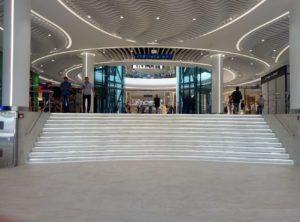
On September, 1 the «Kyivan Rus Park» invites to the horse-trick show «The Princely druzhina». The guests will see the knightly tournament, the Princely hunt, horse-trick performances, will take part in the ancient Slavic amusements, rites, fiery round dances and master-classes. Also the guests will be awaited by the walks on horseback, tasty dishes prepared on open fire, master classes and many more from the life of the medieval city.
Ancient Kyiv opens at 10:00. The program starts at 14:00.
The ticket price: a full adult ticket – 190 UAH, for pensioners and students – 150 UAH, for schoolchildren – 60 UAH, for preschool children – for free.
Ancient Kyiv in the «Kyivan Rus Park» is located in Kyiv region, Obukhiv district, the vill. Kopachiv.
Route taxis leave from Kyiv from the «Vydybitchi» metro station.
Details on the website www.parkkyivrus.com
The Interfax subscribers can save money with the “openbusiness-20” promo code for a 20%-discount for a full price adult ticket to the Principality of Kyivan Rus:
– by previous order by tel.: +38 044 461-99-37, +38 050 385-20-35
– or at the cash desk at the entrance to the «Kyivan Rus Park».

New Yorker Ukraine LLC (Kyiv), which is developing the German clothing and footwear network New Yorker in Ukraine, opens a store in the River Mall trade center at 12 Dniprovska Esplanade in Darnytsky district of Kyiv, thereby expanding the Ukrainian network to ten stores.
According to the press service of the mall, the store will be located on the second floor of the facility and will occupy 1,100 square meters.
The outlet will be the fourth one in Kyiv and the tenth one in Ukraine.
The New Yorker network has been developing in Ukraine since 2011.
According to the company’s website, as of August 22, 2019, the chain had nine stores in Kyiv, Odesa, Lviv, Kharkiv, Kryvy Rih, and Sumy. The New Yorker international chain has more than 1,000 stores in 40 countries.
Ukraine’s banks almost quadruple net profit in Jan-July 2019
KYIV. Aug 22 (Interfax-Ukraine) – Solvent banks in Ukraine in January-July 2019 received UAH 36.7 billion in net profit, which is 3.7 times more than in the same period in 2018, the National Bank of Ukraine (NBU) has said.
According to its data, the income of banks this year increased by 30%, to UAH 141.4 billion, while expenses by 6%, to UAH 104.7 billion.
Based on the previously released data, in July, the net profit of Ukrainian banks grew by 3.8 times, to UAH 5.69 billion: revenues increased by 23.1%, to UAH 20.34 billion, while expenses decreased by 2.5%, to UAH 14.65 billion.
The main factors in the growth of bank profit are the increase in net interest income by 19%, to UAH 46.3 billion, the growth in net commission income by 16%, to UAH 24.7 billion, a positive result from revaluation and from sale and purchase operations (UAH 10.6 billion), a decrease in deductions for reserves to UAH 6.3 billion against UAH 11.6 billion last year.
The NBU expects the sector returns to remain high in 2019.
As reported, in 2018, the banking system’s profit reached a historic high of UAH 21.7 billion.

The Spanish retail operator Inditex Group will open seven new stores of the chain with a total area of 7,400 square meters in the River Mall trade center at 12 Dniprovska Embankment in Darnytsky district of Kyiv.
According to the press service of the shopping center, the new facilities include the country’s largest two-storey Zara store with an area of 3,500 square meters, Zara Home (529 sq m), Massimo Dutti (678 sq m), Pull & Bear (798 sq m), Oysho (408 sq m), Bershka (932 sq m), and Stradivarius (557 sq m).
In general, by the end of 2018, Inditex Group had 65 stores in Ukraine, in particular, such brands as Pull & Bear (14), Zara (9), Zara Home (2), Massimo Dutti (6), Bershka (14), Stradivarius (12), Oysho (7), and Uterque (1).
As reported, Inditex plans to launch online sales of the Zara brand in Ukraine in the fall and winter of 2019.
According to the company’s report, the pretax profit of Inditex in the country in 2018 amounted to EUR28 million.
Inditex Group was founded in 1963. It unites more than 7,000 stores in 91 countries under the brands Zara, Zara Home, Oysho, Massimo Dutti, Bershka, Pull & Bear, Stradivarius, and Uterque.
In Ukraine, Inditex Group has been represented since 2008. At the end of 2016, Inditex presented its first Uterque brand store in the Ukrainian market in the Gulliver trade center.

The focus of this year’s Kyiv Investment Forum that will take place on September 17 at the Mystetskyi Arsenal, lies on the strategy of creation and development of the Kyiv agglomeration. The forum will bring together Ukrainian and international investors, representatives of foreign municipalities, local governments, the Kyiv business elite, IT and art communities. The participants of the forum will discuss the potential of the capital and the Kyiv region as a whole, and will provide recommendations on how to turn Kyiv agglomeration into a modern metropolis: a place of attraction for investors, tourists and innovative entrepreneurs.
“Given the popularity of urban tourism, the Kyiv agglomeration has the potential of becoming one of Europe’s hubs for various festivals, artistic events, culinary tourism, and for the creative economy. Our goal is to create the Greater Kyiv brand, just like the world-famous Greater London,” says Vitali Klitschko, the Kyiv Mayor.
Special guests of the Investment Forum will be representatives of the political elite and foreign municipalities from around the world who will share their experiences.
The event includes panel discussions with the participation of the leading experts on the social identity of Kyiv and the creative economy for the future agglomeration, as well as discussions on the infrastructure solutions for the development of the metropolis of the future. Attention will also be paid to potential accelerators for the development of metropolitan tourism like cultural, musical and sporting events.
The Kyiv Investment Forum 2009 is an event that signals unification and mutually beneficial inter-municipal cooperation to accelerate the socio-economic development of all communities involved.
Last year’s Kyiv Investment Forum was held on November 27 and gathered more than 500 participants from 23 countries. In particular, business and investment communities, central and city governments, international financial institutions and the media. 30 urban projects were presented during the forum to attract investment in various fields of innovation.

Araks Group of Companies (Kyiv) in the end of September will open a new furniture trade center with a total square of 15,000 square meters in the village of Khodosivka of Kyiv region, a group’s press service reported. “A decision to open a new trade center and to develop Araks furniture network is carefully worded. We engross our business and we’re glad to cooperate with the new brands, which will be displayed at the new furniture center,” Araks group quotes one of its shareholders Harush Antonian as saying on Monday.
According to a press release, the new three-storey shopping center, 25 kilometers away from Kyiv, will consist of the shops with household goods: furniture, kitchen, lighting, floor coating, textile, decoration and others. Armenian classicism combined with modernistic forms is at the bottom of the architecture, the company said.
The first Araks furniture trade center with a square of 27,000 square meters at 110 Kiltseva Street opened in 2009.
In public cadastral map, Kyiv-based Business-Techno Plaza LLC is owner of the land plot with a square of three hectares on which the center was built.

The new Ambassador of France to Ukraine, Etienne de Poncins, has arrived in Kyiv. “I’ve safely arrived in Kyiv. My mission as the head of the French Embassy in Ukraine may begin,” the diplomat wrote on Twitter.
Etienne de Poncins was appointed Ambassador of France to Ukraine on July 24. Prior to that, he worked as an inspector of the French Foreign Ministry, and in the European External Action Service, and was also the French ambassador to Kenya and Bulgaria.
The previous Ambassador of France to Ukraine, Isabelle Dumont, completed her work in Ukraine on July 27.